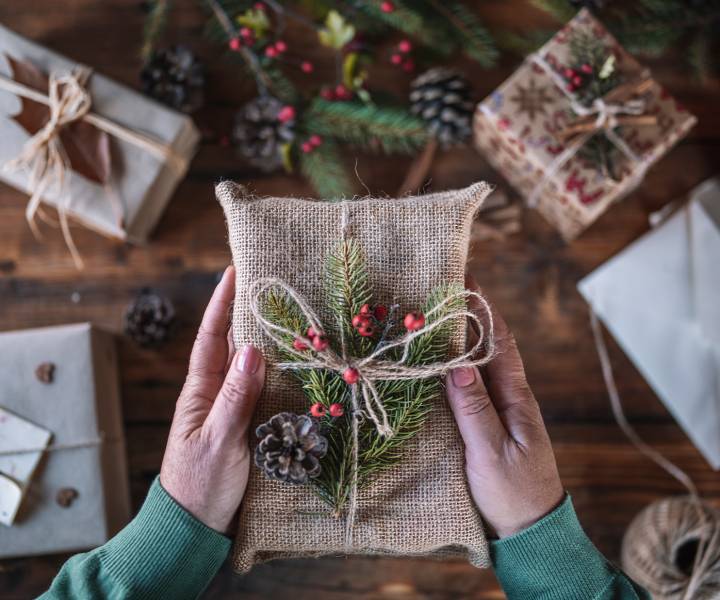Homes
12 ways to have a sustainable Christmas
by Rae Ritchie

Never mind a white Christmas, make it a greener one, says Rae Ritchie. Here’s how to reduce the carbon footprint of the festive season without feeling like Scrooge
1. Renegotiate with Father Christmas
According to a study on the environmental impact of Christmas, the average adult spends £600 on gifts – 20% of which are totally unwanted. It’s a waste of money and resources, so try having an honest conversation with family and friends about whether it’s time to stop playing Santa with each other or stick to buying for children only. You might even find they’re relieved at the idea.
2. Swap stocking fillers
Jen Gale, author of The Sustainable(ish) Living Guide and The Sustainable(ish) Guide to Parenting (Bloomsbury, £12.99 each), suggests organising an exchange evening with friends in the run-up to Christmas: ‘Ask everyone to have a sort-out and bring along anything they no longer want or need. You can then swap. This works really well with kids’ toys and books for stocking fillers.’
3. Cut down the cards
Hate writing Christmas cards? Here’s your excuse to stop: the 1 billion Christmas cards that Brits send generate 140,000 tonnes of carbon. If you do buy cards, check for Forest Stewardship Council (FSC) certification on the back to ensure that the paper was responsibly sourced (this is a good habit to get into when buying other greetings cards too).
4. Boycott glitter
Glitter is an environmental nightmare. It’s a microplastic and not recyclable, so avoid cards, gift wrap and anything else with it on.
5. Reduce, reuse, recycle, wrap
A mind-boggling 277,000 miles of wrapping paper gets thrown away in the UK every year. Avoid adding to that figure by following the three ’R’s. Reduce: look for alternatives such as newspaper or fabric squares. Reuse: dig out that stash of gift bags and put them back into circulation (and remember to save any you’re given this year). Recycle: look at the label before buying new gift wrap to check that it is recyclable.
6. Substitute the sticky tape
To misquote Jane Austen, it’s a truth universally acknowledged that you will run out of sticky tape in December. When you do, opt for an eco-friendly replacement such as a paper tape or even string and ribbon, as the usual stuff is made from polypropylene, a type of plastic that isn’t widely recycled.
7. Forego fake fir
‘Artificial Christmas trees are made from non-sustainable plastics,’ reports Georgina Wilson-Powell in Is It Really Green? Everyday Eco-Dilemmas Answered (DK, £12.99). ‘You’d have to use a fake tree for 10 years before it became more energy efficient than using a real tree each year, but even then you’re left with a tree that does not decompose. Real trees are the greener option.’
8. Avoid single-use
Eschew single-use items in favour of reusable ones, including:
• Cloth napkins instead of paper
• Fabric table coverings instead of disposable
• Metal cutlery instead of plastic
• Decorations with replaceable batteries or plugs instead of sealed units
9. Create your own crackers
Much of the detritus left on the table after Christmas lunch comes from crackers – and not a lot of it is recyclable. Nip this problem in the bud by making your own and filling them with items that you would actually like to win. You can even get reusable sleeves from Keep This Cracker (keepthiscracker.com).
10. Ask guests to help
‘Sharing supplies is so much better than having to buy and store them,’ says Kathryn Kellogg, author of 101 Ways to Go Zero Waste (Countryman Press, £9.99) – so if you’re hosting, ask guests to bring whatever you don’t have enough of, whether that’s wine glasses, plates or an extra chair.
11. Adjust the thermostat
Expecting a full house? Turn the thermostat down a degree or two before guests arrive, especially if you also have the oven on. The rooms you’re using will soon start to feel too hot with everyone in them, so save yourself some cash and some carbon by lowering the setting sooner rather than later. Keep this up all year and you could save up to £55 – and 300kg of carbon dioxide.
12. Don’t like it? Don’t buy it!
Food waste rockets faster than Santa’s sleigh at Christmas. We spend about £220 more than usual on food, then throw 250,000 tonnes of it away. Minimise your food waste by only buying what you know stands a chance of being consumed. When no-one in your house likes it, leave it on the shelves. Whether it’s Brussels sprouts or sherry, nothing creates more waste than a product that wasn’t wanted in the first place.












